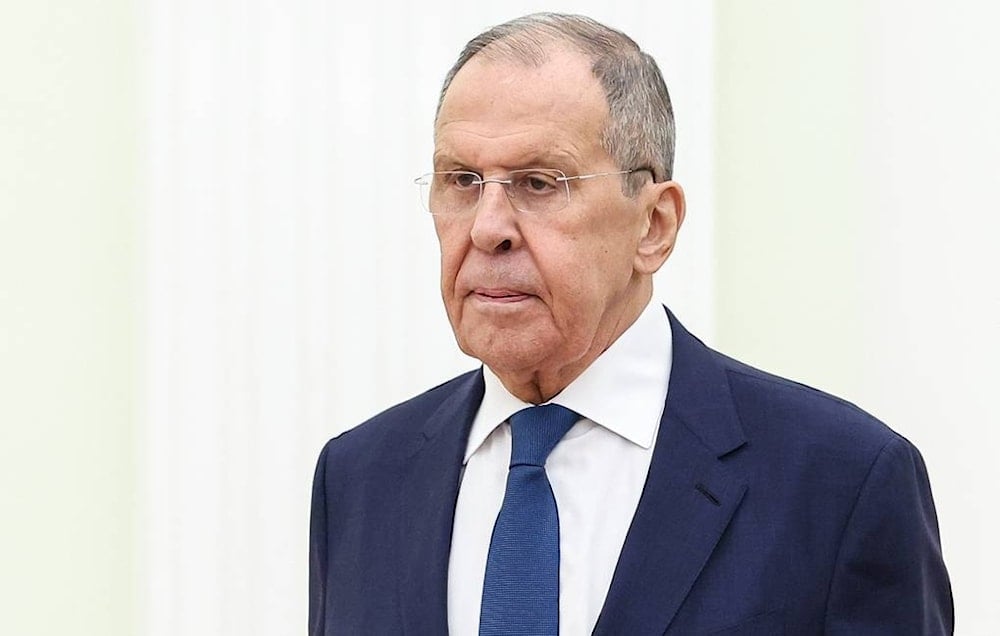Western calls for ceasefire meant to buy time for Zelensky: Lavrov
Russian Foreign Minister Sergey Lavrov rejected Western-backed ceasefire proposals, accusing Kiev and its allies of using peace talks to stall Russia's advance, as he confirmed that plans for a Trump-Putin summit remain under discussion.
-

Russian Foreign Minister Sergey Lavrov (TASS)
Russian Foreign Minister Sergey Lavrov has dismissed renewed appeals for a ceasefire in Ukraine, claiming they are an attempt to give Ukrainian President Volodymyr Zelensky a temporary reprieve and to halt Russia's battlefield momentum.
Speaking in an interview with Hungary's Ultrahang YouTube channel, Lavrov accused Kiev and its Western backers of using peace initiatives as a stalling tactic.
"When people now say, ceasefire, we know that they want just to buy some time again. And that this logic, which is deeply rooted in Zelensky, whatever moves his head, brain, is obvious for any objective observer," he said.
Trump-Led peace plan
Lavrov's remarks came just days after European and Ukrainian leaders endorsed a new US-backed peace initiative led by President Donald Trump, calling for an immediate ceasefire along current frontlines and negotiations based on the existing territorial balance. The joint declaration, signed by Zelensky and several European heads of government, expressed support for what Trump described as a "just and lasting peace," to be discussed at an upcoming Budapest summit with Russian President Vladimir Putin.
In parallel, European nations, in coordination with Ukraine, have drafted a 12-point peace proposal that would formalize a halt to hostilities, establish a US-chaired peace council led by Trump, and provide Kiev with security guarantees and post-war reconstruction funds. The plan reportedly envisions prisoner exchanges, the return of deported children, and a moratorium on territorial advances, though it stops short of recognizing Russia's control over occupied areas. Moscow, however, has reiterated its earlier conditions, including full control of the Donbas region and recognition of its sovereignty over annexed territories.
Ceasefire skepticism deepens
Lavrov's remarks come amid this fresh wave of Western diplomatic efforts to push for a pause in fighting, which Moscow views as an attempt to rebuild Ukraine's military capabilities rather than establish genuine peace. Russian officials have consistently argued that previous truces, such as the Minsk agreements, were used by Kiev to prepare for future offensives. Analysts say Moscow now sees no advantage in halting operations while its forces retain tactical momentum across several fronts.
The foreign minister's hard line also reflects Russia's insistence that any ceasefire must address what it calls the "root causes" of the conflict, including Ukraine's NATO ambitions, recognition of Russian sovereignty over annexed territories, and long-term security guarantees for Moscow. Accepting a ceasefire without those terms, Lavrov suggested, would only "freeze" the conflict on Western terms.
Summit uncertainty
His comments also came as discussions continued around a potential summit between Russian President Vladimir Putin and US President Donald Trump, which he confirmed remains under consideration despite recent confusion over scheduling.
"The initiative is there, and we are polite people. And when we are invited, we say, yes, let's agree how and where and when. And when this invitation is canceled, as President Trump said yesterday in the White House. Later they said that 'cancel' means 'postpone.' It's up to those who initiated the process," Lavrov stated.
Limited dialogue
The foreign minister revealed that he had recently spoken by phone with US Secretary of State Marco Rubio, describing the conversation as productive but noting that no follow-up had been planned.
"After we talked with Marco Rubio regarding following up on the results of Alaska, he did not mention any new meetings or conversations. And I did not raise the issue, because the entire initiative was coming from the United States. And we would be ready to move as the Americans feel comfortable for themselves," he explained.
Noninterference stance
Lavrov added that Moscow has no interest in meddling in US internal debates over Ukraine policy, arguing that Washington is already facing conflicting pressures from both European allies and Kiev.
"From the diplomatic point of view, we don't want to interfere in their internal considerations. We don't want to create some discomfort for the United States, which is under huge, unbelievable pressure from the European 'hawks,' from Zelensky, and others who don't want to have any American-Russian cooperation on anything," he said.
Diplomatic observers say Lavrov's statements serve several purposes: to reinforce Moscow's opposition to a short-term truce, to signal patience in awaiting a potential Trump-Putin dialogue, and to project Russia as acting from a position of strength.
Read more: SVR chief says NATO Europe preparing for war with Russia

 5 Min Read
5 Min Read











